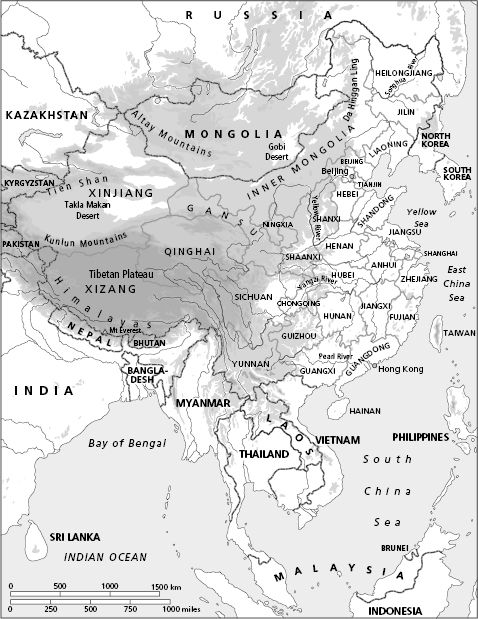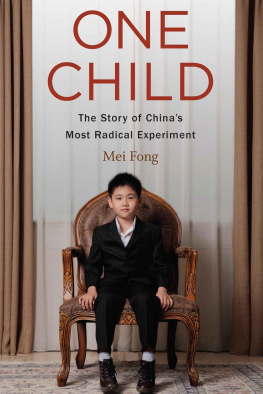
Series page
China Today series
- Greg Austin, Cyber Policy in China
- Steven M. Goldstein, China and Taiwan
- David S. G. Goodman, Class in Contemporary China
- Stuart Harris, China's Foreign Policy
- Elaine Jeffreys with Haiqing Yu, Sex in China
- You Ji, China's Military Transformation
- Michael Keane, Creative Industries in China
- Joe C. B. Leung and Yuebin Xu, China's Social Welfare
- Orna Naftali, Children in China
- Pitman B. Potter, China's Legal System
- Pun Ngai, Migrant Labor in China
- Xuefei Ren, Urban China
- Judith Shapiro, China's Environmental Challenges 2nd edition
- Alvin Y. So and Yin-wah Chu, The Global Rise of China
- Teresa Wright, Party and State in Post-Mao China
- LiAnne Yu, Consumption in China
- Xiaowei Zang, Ethnicity in China
Copyright page
Copyright Orna Naftali 2016
The right of Orna Naftali to be identified as Author of this Work has been asserted in accordance with the UK Copyright, Designs and Patents Act 1988.
First published in 2016 by Polity Press
Polity Press
65 Bridge Street
Cambridge CB2 1UR, UK
Polity Press
350 Main Street
Malden, MA 02148, USA
All rights reserved. Except for the quotation of short passages for the purpose of criticism and review, no part of this publication may be reproduced, stored in a retrieval system, or transmitted, in any form or by any means, electronic, mechanical, photocopying, recording or otherwise, without the prior permission of the publisher.
ISBN-13: 978-0-7456-8054-5
ISBN-13: 978-0-7456-8055-2 (pb)
A catalogue record for this book is available from the British Library.
Library of Congress Cataloging-in-Publication Data
Naftali, Orna, author.
Children in China / Orna Naftali.
pages cm
Includes bibliographical references and index.
ISBN 978-0-7456-8054-5 (hardback) ISBN 978-0-7456-8055-2 (pbk.) 1. ChildrenChinaSocial conditions. I. Title.
HQ792.C5N337 2016
305.230951dc23
2015023559
Typeset in 11.5 on 15 pt Adobe Jenson Pro
by Toppan Best-set Premedia Limited
Printed and bound in Great Britain by CPI Group (UK) Ltd, Croydon
The publisher has used its best endeavours to ensure that the URLs for external websites referred to in this book are correct and active at the time of going to press. However, the publisher has no responsibility for the websites and can make no guarantee that a site will remain live or that the content is or will remain appropriate.
Every effort has been made to trace all copyright holders, but if any have been inadvertently overlooked the publisher will be pleased to include any necessary credits in any subsequent reprint or edition.
For further information on Polity, visit our website: www.politybooks.com

Chronology
| 18941895 | First Sino-Japanese War |
| 1911 | Fall of the Qing dynasty |
| 1912 | Republic of China established under Sun Yat-sen |
| 1927 | Split between Nationalists (KMT) and Communists (CCP); civil war begins |
| 19341935 | CCP under Mao Zedong evades KMT in Long March |
| December 1937 | Nanjing Massacre |
| 19371945 | Second Sino-Japanese War |
| 19451949 | Civil war between KMT and CCP resumes |
| October 1949 | KMT retreats to Taiwan; Mao founds People's Republic of China (PRC) |
| 19501953 | Korean War |
| 19531957 | First Five-Year Plan; PRC adopts Soviet-style economic planning |
| 1954 | First constitution of the PRC and first meeting of the National People's Congress |
| 19561957 | Hundred Flowers Movement, a brief period of open political debate |
| 1957 | Anti-Rightist Movement |
| 19581960 | Great Leap Forward, an effort to transform China through rapid industrialization and collectivization |
| March 1959 | Tibetan Uprising in Lhasa; Dalai Lama flees to India |
| 19591961 | Three Hard Years, widespread famine with tens of millions of deaths |
| 1960 | Sino-Soviet split |
| 1962 | Sino-Indian War |
| October 1964 | First PRC atomic bomb detonation |
| 19661976 | Great Proletarian Cultural Revolution; Mao reasserts power |
| February 1972 | President Richard Nixon visits China; Shanghai Communiqu pledges to normalize USChina relations |
| September 1976 | Death of Mao Zedong |
| October 1976 | Ultra-Leftist Gang of Four arrested and sentenced |
| December 1978 | Deng Xiaoping assumes power; launches Four Modernizations and economic reforms |
| 1978 | One-Child family planning policy introduced |
| 1979 | United States and China establish formal diplomatic ties; Deng Xiaoping visits Washington |
| 1979 | PRC invades Vietnam |
| 1982 | Census reports PRC population at more than one billion |
| December 1984 | Margaret Thatcher co-signs Sino-British Joint Declaration agreeing to return Hong Kong to China in 1997 |
| 1986 | Compulsory Education Law of the People's Republic of China introduced |
| 1989 | Tiananmen Square protests culminate in June 4 military crackdown |
| 1991 | Law of the People's Republic of China on Protection of Minors introduced |
| 1992 | Deng Xiaoping's Southern Inspection Tour re-energizes economic reforms |
| 19932002 | Jiang Zemin is president of PRC, continues economic growth agenda |
| 1994 | Outline on the Implementation of Patriotic Education published |
| 1999 | Education for Quality reform plan introduced nationwide |
| November 2001 | WTO accepts China as member |
| 20022012 | Hu Jintao, General-Secretary CCP (and President of PRC from 2003) |
| 20022003 | SARS outbreak concentrated in PRC and Hong Kong |
| 2006 | PRC supplants US as largest CO2 emitter |
| August 2008 | Summer Olympic Games in Beijing |
| 2010 | Shanghai World Exposition |
| 2012 | Xi Jinping appointed General-Secretary of the CCP (and President of PRC from 2013) |
Acknowledgements
My research and writing of this book would not have been possible without the generous support of many individuals. Primarily, I want to express my heartfelt thanks to the editors at Polity Press. Emma Longstaff first approached me with the idea for the book, and I am extremely grateful for the faith she has placed in me, as well as for her enthusiasm and helpful guidance throughout the early phases of the project. My deep appreciation also goes to Jonathan Skerrett at Polity for suggesting many concrete improvements, and to two anonymous reviewers who provided encouraging feedback and thoughtful comments on the draft manuscript.
Next page









